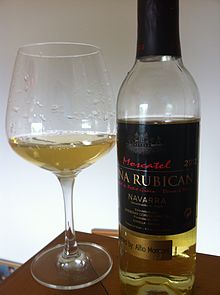Muscatel

Muscatel (/ˌmʌskəˈtɛl/ MUSK-ə-TEL) may refer to any type of wine made from muscat grapes. In the United States, however, “muscatel” normally refers only to fortified wine made from these grapes. Fortified muscatel became popular in the United States at the end of Prohibition, when, in order to meet the sudden surge in demand for wine, some inferior strains of muscat grapes (normally sold as table grapes or made into raisins) were mixed with sugar and cheap brandy to produce what came to be pejoratively referred to as “wino wine.” As a result, the label “muscatel” became associated in the U.S. with inferior-quality wine, so that today in that country, fine wines made from superior strains of muscat grapes tend not to be called “muscatel.”[1] However, outside the U.S., “muscatel” (sometimes spelled “moscatel”) refers to the full range of wines made with muscat grapes.
In 16th-century Germany, “muscatel” was also the term for Rhine wines to which elderflower-infused Salvia sclarea had been added to make a more potent beverage. The varietal of the plant used in this concoction thus acquired the common name, "muscatel sage".[2]
See also
[edit]References
[edit]- ^ Hailman, John R. (2006). Thomas Jefferson on Wine. University Press of Mississippi. p. 50. ISBN 9781578068418.
- ^ Rodale's Illustrated Encyclopedia of Herbs
